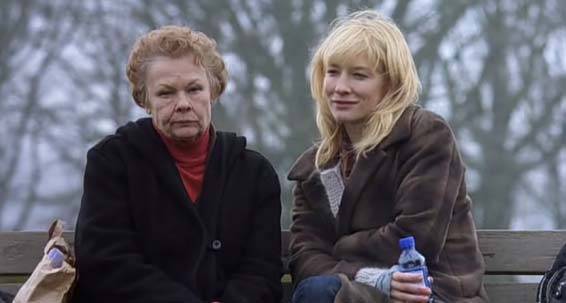JUDY DENCH AND CATE BLANCHETT IN NOTES ON A SCANDAL
Richard Eyre: Notes on a Scandal (2006)
Much ado
Review by Chris Knipp
Why does this story of pinched desire and mindless indiscretion, for all its color and life, feel glib and superficial? Perhaps it’s disadvantaged by being a celebrity project, with two overexposed superstars, Cate Blanchett and Judi Dench, both playing characters who are heavily programmed. I don’t personally trust Patrick Marber, who worked on the screenplay adaptation from Zoe Heller's novel. His play-to-film adaptation Closer felt similarly cold and manipulative. The difference here is an even higher level of melodrama. And then it’s the main characters: one is repulsive, the other shallow.
Dench plays Barbara, a needy, lonely lesbian teacher whom even this famous, powerful actress couldn’t make us sympathize with for a minute were it not for the device of having her be the narrator. Like the main character of Patricia Highsmith’s novel, Edith’s Diary, Barbara describes events as she would like them to be rather than as they are.
Barbara’s new obsession (not the first, we learn) is the pursuit of a relationship with an attractive young woman newly arrived on the scene, a project that becomes momentarily plausible through a chance opportunity at blackmail. Barbara and Sheba (Blanchett) are both teachers at a school where Barbara is an old hand and Sheba a newcomer. Sheba is a pretty, directionless ex-bohemian unwisely taking a stab at teaching art. She’s seemingly unaware of how bored she is with her marriage, but that’s why she’s trying her hand in the classroom. The full extent of her foolishness and desperation comes out when she quite quickly gets involved in a sexual affair with one of her students, a fifteen-year-old Irish boy named Stephen Connolly (Andrew Simpson). As Sheba’s enraged husband Richard (Bill Nighy) later points out, this is something everybody is tempted by at some point, but always resists. If we can manage not to see her as criminal, which legally she is, we certainly must see Sheba as criminally stupid. It's hard to say whether the movie's focus on these two women feels more condescending toward us or toward the characters.
There are two lines of action. Stephen pursues Sheba with surprising success. He persuades her to give him special drawing lessons and arouses her sympathy by lying about his family and saying his father beats him and his mother is seriously ill. He turns out to come from a happy, healthy home, such a nice one you wonder why his English is so bad. A few nice words (“You don’t realize how beautiful you are, Miss”) and forward gestures, and he’s there. He and Sheba have hot sessions on the ground by a train track, in a storage room at the school during a school event, and later in what Richard calls her “lair,” a studio next to her home that she has admitted is just a place to escape to.
Barbara is delighted to spy the connection at school and immediately realizes this is the opportunity to forge an unbreakable bond with her love object – by promising to say nothing, and then becoming the central person in Sheba’s life. This is not so far fetched, since Sheba liked her at first, and of course she has to be nice to Barbara now. Barbara proceeds to imagine a wonderful relationship growing out of this nastiness.
Unfortunately Barbara demands that Sheba come to comfort her on the death of her cat at the precise moment when the family is off to see their son perform for the first time in a school play, and Sheba has to say no. She promises to end the affair with the boy but doesn't, and Barbara catches Stephen talking dirty to Sheba on her mobile phone. Too bad for Sheba. Revenge follows.
Richard screams at Sheba when he finds out, and demands to know why she got into such a thing. Her most heartfelt reply is an emphatic if vapid, "I don’t know!" "The opera has begun," Barbara says, and the yelling and emotional excess do suggest arias from some telenovela-style musical drama.
The film is well paced and lively and good-looking. But the acting skills of Blanchett are Dench are largely wasted here. It’s only the yelling and running around, which director Eyre would have done well to put a rein on, that linger in the mind when it’s all over. Chris Menges makes the photography look attractive, but the ladies become pretty disheveled before the squabbling is over, Sheba is in on her way to jail, Barbara has been forced into early retirement, and we are left wondering what it was all about. Director Eyre (of Iris, in which Dench unquestionably shone, and Stage Beauty, which quickly faded) seems a bit overpowered this time by his luminous cast and inexplicably celebrated adapter. This movie is inevitably watchable, but we shouldn't be fooled into thinking it significant.





 Reply With Quote
Reply With Quote
Bookmarks